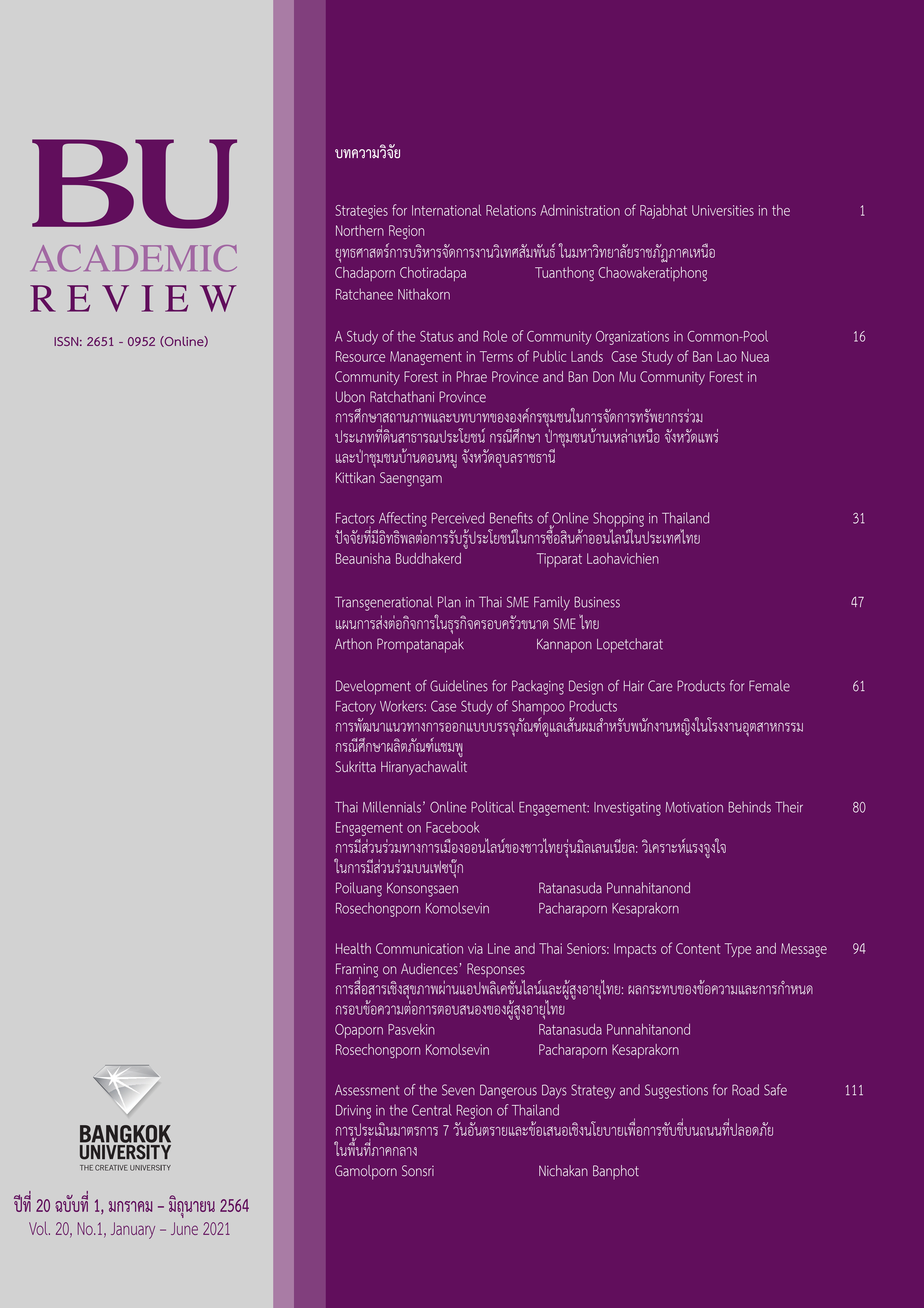Strategies for International Relations Administration of Rajabhat Universities in the Northern Region
Main Article Content
Abstract
This research aimed to 1) study states, problems, and factors related to international relations administration in Rajabhat Universities in the northern region, 2) develop strategies for international relations administration in Rajabhat Universities in the northern region, and 3) assess the strategies. The research procedures were divided into three steps as follows: 1) studying states, problems, and factors related to international relations administration in Rajabhat Universities in the northern region. Data were obtained through the use of questionnaires and in-depth interview. 2) Developing the strategies for international relations administration in Rajabhat Universities in the northern region by holding workshops. The strategies were then validated by holding a connoisseurship, and 3) assessing the strategies by the experts. The research findings were as follow: 1) the states of international relations administration in Rajabhat Universities in the northern region revealed that plans, responsible persons and activities were set, and there was incentives for personnel to achieve their goals. The problems found were related to the lack of setting policy based on the strategy of international relations administration, and lack of internationalization in the organized structures. The internal strength revealed that staff in Rajabhat universities in the northern region had high responsibility and had international networks. The internal weakness was the different status of international relations office in each university. The external opportunity concerned high technology that was helpful for international relations. The internal threats was the local people did not understand the role of international relations. 2) The strategies for international relations administration in Rajabhat Universities in the northern region consisted of 10 strategies including vision, mission, goal, strategic issue, strategy, Key Performance Indicator and measure, and 3) the assessment of the strategies revealed consistency, suitability, and acceptability at a high to highest level.
Article Details
The manuscript submitted for publication must be the original version, submitted only to this particular journal with no prior acceptance for publication elsewhere in other academic journals. The manuscript must also not violate the copyright issue by means of plagiarism.
References
Bartol, K., & Martin, D. (1998). Management. Boston: McGraw-Hill.
Boonyathithan, E. (2010). Khūmư̄ wikhro̜ SWOT yāng mư̄ʻāchīp [Professional SWOT guideline].
Bangkok: Panyachon Distributor.
Cheevapruk T. (2008). Kānphatthanā rūpbǣp kānbō̜rihān čhatkān ngān withētsamphan khō̜ng
sathāban ʻudomsưksā [Development of management model for international relations of
higher education institutions] (Master’s thesis, King Mongkut’s University of Technology
North Bangkok).
Chinowsky, P., & Carrillo, P. M. (2007). Knowledge management to learning organization connection.
Journal of Management in Engineering, 23(3), 122-130.
Chotiradapa, C. (2017). Khunnalaksana samkhan khon withētsamphan sū čhutyư̄n thailǣn sī . sū
kap khwām plīanplǣng thī thāthāi [The characteristics of international relations officers, standpoint under the model of Thailand 4.0 tasks in the challenges changing]. Kasalongkham Research Journal, 11(3), 196 -203.
Daft, R. L. (2010). Management (9th ed.). Canada: South-Western Cengage Learning.
Dahal, K. R. (2011). Mass media and law. Kathmandu: Nepal Press Institute.
Davis, D., & Daley, B. J. (2008). The learning organization and its dimensions as key factors in firms’
performance. Human Resource Development International, 11(1), 51-66.
Ghillyer, A. (2012). Management now: Skills for 21st century management. New York: McGraw-
Hill
Juito, S. (2015). Khrư̄angmư̄ kānčhatkān ʻongkān [Tools of organization management]. Nonthaburi:
Sukhothai Thammathirat Open University.
Kaewjumnong, A. (2012). Kānčhatkān chœ̄ngkon yut (Phim khrang thī 2) [Strategy management
(2nd ed.).]. Songkla: Taksin University Book Center.
Kanjananiyot P. (2009). Lap khom khon withēt [Sharpening international relations officer]. Bangkok:
Thailand – United States Educational Foundation (Fulbright).
Kanjananiyot, P. (2019). Sēnthāng sū khwāmpen sākon IZN: tœ̄m tem khwāmpen phonlalōk yāng
mī khunnaphāp [Preliminary guidelines on internationalization, IZN: Fulfilling the quality of
global citizenship]. Bangkok: Bureau of International Cooperation Strategy, Office of the
Higher Education Commission.
Komchadluek. (2017). Rātchaphat tō̜ng penthī phưng khō̜ng chumchon khūapkhū keng wichākān
thưng čha pai rō̜t [Rajabhat must be dependable by the community with academic
excellence to survive]. Retrieved April, 8, 2018, from https://www.komchaluek.net/news/
edu-health/304603.
Maesincee, S. (2016). Prathēt Thai 4.0 [Thailand 4.0]. Retrieved April 8, 2018, from
https://web.facebook.com/drsuvitpage/posts/thailand-40-สร้างความเข้มแข็งจากภายใน-เชื่อมโยง
เศรษฐกิจไทยสู่โลกพลวัตการเปลี่ยนแปลง.
Maharatsakul, P. (2017). Konlayut kānwāngphǣn læ kānčhatkān [Planning and management
strategy]. Bangkok: Panyachon Distributor.
Mintzberg, H. (2007). Tracking strategies: Towards a general theory. Oxford, New York:
Oxford University Press.
Morrison, K. (2009). Educational innovation in Thailand: A case study. International Education,
(2), 29-55.
Quinn, A. A. (1991). A theoretical model of the premenopausal process. Journal of Nurses-
Midwifery, 36(1), 25-29.
Rasameeteth, B. (2015). Mummō̜ng ngān withētsamphan Thai - thēt [Thailand & overseas
international relations perspective]. Bangkok: Kasetsart University.
Sunsawat, N. (2009). Kānčhatkān chœ̄ng yutthasāt phư̄a khwām daiprīap thāngkān khǣngkhan
[Strategic management to competitive advantage]. Bangkok: Wanthip publishing.
Tansawat, A. (2010). Kānphatthanā yutthasāt kānbō̜rihān čhatkān phư̄a khwāmpen lœ̄t khō̜ng
Khana Kharusāt / sưksā sāt [The development of management and administration
strategies for the excellence of faculty of education] (Dissertations, Chulalongkorn
University).
The Higher Education Commission. (2018). Bureau of international cooperation strategy 2015-2018.
Bangkok: Office of the Higher Education Commission.
Ubonlwatra, T. (2007). Kānnam sanœ̄ yutthasāt khō̜ng sathāban ʻudomsưksā Thai nai bō̜ribot kān
pœ̄t sērī thāngkān khā [Proposed strategies for Thai higher education institutions in the
context of free trade agreement] [Master’s thesis, Chulalongkorn University].
Udom, J. (2016). Kānphatthanā yutthasāt ʻongkō̜n hǣng kānrīanrū mahāwitthayālai rātchaphat
klum Rattanakōsin [The development of learning organization strategies for the
Rattanakosin group of Rajabhat Universities] (Dissatations, Ramkamhang University).
Wiratchaniphawan, W. (2012). Kānbō̜rihān čhatkān læ kānbō̜rihān yutthasāt khō̜ng nūaingān
khō̜ng rat [Management administration and strategic administration of the state agencies]
Bangkok: Forepace Publisher.
Witayaudon, W. (2008). Thritsadī ʻongkān [Organization theory]. Bangkok: Thanathud Printing.


